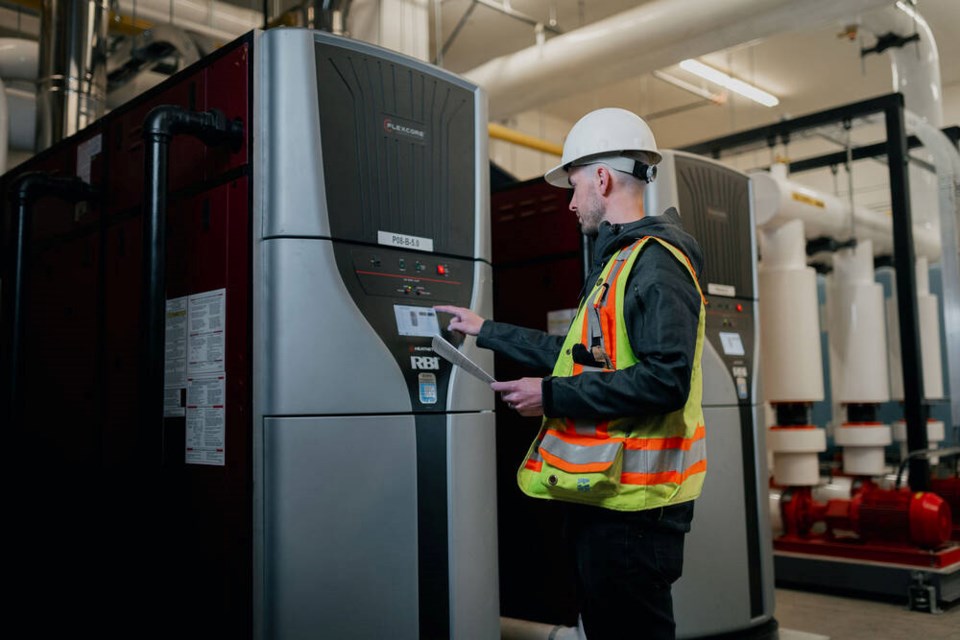The City of North Vancouver’s Lonsdale Energy Corp. will soon start heating homes with electric boilers.
Plans for the municipally-owned utility were discussed at the city’s Oct. 7 meeting when council, which acts as the regulator for LEC, set a 4.6 per cent increase in the rates consumers will pay for their heating in the next year.
Today, the LEC warms about 7,000 homes, businesses and public facilities in 108 buildings using heat pumped out of eight energy plants connected by 15 kilometres of hydronic pipes. Almost all of that heat comes from natural gas.
In the fall of 2025, LEC will commission an electric boiler plant in a new condo building on West 15th Street. With its three megawatts of capacity, the boilers could lower the system’s greenhouse gas emissions by 1,300 tonnes from the time it goes online until the end of 2025, according to staff.
Running the electric boilers will cost the utility about $200,000 more per month than burning gas would, so rates will be going up by an additional 2.9 per cent. For a typical LEC customer living in a 750-square-foot apartment, that would translate to a $3-per-month increase in heating costs, according to staff.
Decarbonization controversy
Members of council had no qualms with the rate increase. Some activists in the community, however, have zeroed in on LEC’s shortcomings – both in its continued reliance on carbon-intensive natural gas and its inability to provide increasingly important cooling in the summers.
Lauri Parkinson specifically called out LEC’s use of more expensive renewable natural gas, or RNG, as a “low carbon” source of heat. Rather than being fracked from the ground, RNG is captured from sources where there is already organic material decomposing including landfills, wastewater treatment plants and farms.
“Burning RNG produces exactly the same emissions as burning natural gas,” Parkinson said, adding that the RNG LEC purchases gets pumped through the same gas pipelines as everyone else’s fossil gas and therefor, it’s not actually getting used by the customers in North Vancouver who are paying for it.
“There is no scientific reason for Lonsdale Energy to spend this money for RNG or charge their customers for RNG because it does not decarbonize LEC,” she said.
Judith Brook called for the City of North Vancouver to end its policy of requiring new buildings to source their heat from LEC when better options are available.
“Electric air source heat pumps have been available and in use for many, many years, supplying both heat and cooling, but if you live within the mandated service area, you cannot install and enjoy them,” she said. “RNG is not a climate saviour at all, and I really hope that people can see that we must electrify, and we have the means. What we don’t have is excess time to slowly move in the right direction.”
LEC is currently working on a decarbonization road map intended to have the system carbon neutral by 2050, as well as a plan to introduce cooling services for new buildings that will tie into the system in the future, according to staff. Industrial scale heat pumps are one of the technologies they are looking to for that.
Last month, the Lonsdale Energy Corp. went public with plans to build a $24-million plant that will recover heat from raw sewage flowing through North Vancouver’s pipes and feed it back into the system. That project, which is set to begin construction next year and come online in 2027, is expected to save about 7,600 tonnes in carbon emissions per year and get LEC to its goal of using 40 per cent low-carbon energy by 2027.
Karsten Veng, Lonsdale Energy Corporation’s CEO, acknowledged the controversy and highlighted the direction LEC is now moving in.
“We have said in the past, and I’ll say it again, that we consider RNG as a transitioning fuel,” he said. “I think the achievements that we have made in the last couple of years show that we on a right trajectory and that we’re achieving some of the goals that have been put forward by council, that we’re starting to decarbonize the system in a grand way.”
Although the meeting was strictly to set the LEC rate increase for 2025, council members also acknowledged the concerns raised by Parkinson and Brooks.
“We’re looking at trying to make a balance, to make a transition with Lonsdale Energy Corp. It’s not perfect,” said Coun. Tony Valente. “But I do think, on the whole … that this plan is reasonable tonight and I’m happy to support it.”



